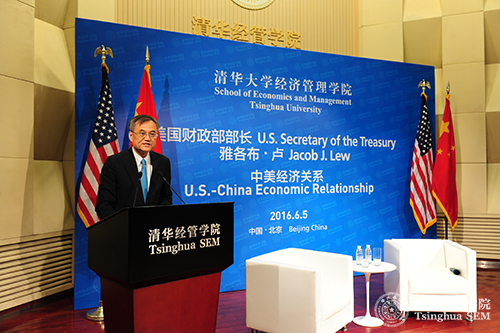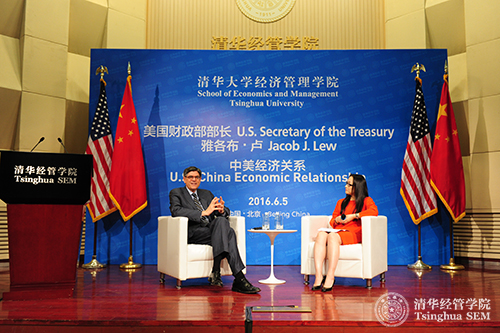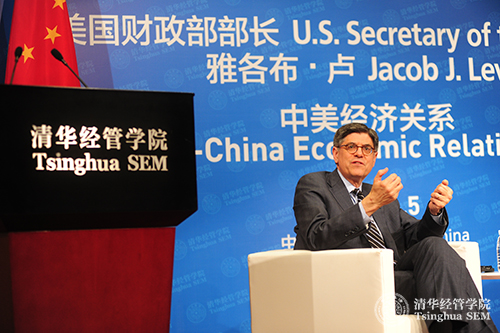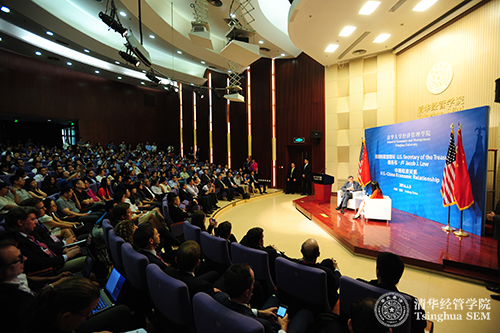On the afternoon of June 5, 2016, U.S. Secretary of
Treasury Jacob J. Lew visited Tsinghua University School of Economic and
Management (Tsinghua SEM), and engaged in a dialogue on U.S.-China Economic
Relationship. The introductory remarks was given by Professor QIAN Yingyi, Dean
of Tsinghua SEM, and the dialogue was moderated by Dr. YANG Yanqing, Deputy
Editor-in-Chief of Yicai Newspaper and Managing Director of Yicai Research
Institute.
In the
introductory remarks, Tsinghua SEM Dean QIAN Yingyi welcomed U.S. Secretary of
Treasury Jacob Lew to Tsinghua University and the School of Economic and
Management. Dean QIAN introduced the Secretary’s career and educational
backgrounds, as well as the history of Tsinghua SEM. Dean QIAN expressed that
Tsinghua SEM is active in academic and policy research in economics and finance
on issues relevant to China and the global economy. The School regularly
hosts academics and policy makers to speak and discuss on the critical issues
facing the Chinese economy. Dean QIAN said that “We are particularly interested
in research on the economic relationship between China and the U.S. in the
global economy. U.S.-China economic relationship is obviously the most important
bilateral economic relationship today and has enormous impact on the global
economy”. He cited figures to illustrate this point: "In 1981, China’s GDP
was only 6% of the U.S. Last year in 2015, it was nearly 60% of the U.S.
Moreover, the combined GDP of the two economies accounted for 36% of the
world’s total. "He believed that the discussion with Secretary Lew will
give the students and faculty of this important bilateral economic relationship
from the U.S. perspective and provide food for thought for research at the
School.

Tsinghua SEM Dean QIAN Yingyi giving the introductory remarks
During the dialogue, Secretary Lew has provided his views
on range of issues including the 8th U.S.-China Strategic and Economic
Dialogue, macroeconomic policy and excess capacity, G20 and WTO as well as
other hot topics.

U.S. Secretary of Treasury J. Lew discussing U.S.-China Economic
Relationship at Tsinghua SEM
U.S.-China Strategic and Economic Dialogue
The 8th U.S.-China
Strategic and Economic Dialogue will begin soon after in Beijing. With regards
to the achievements and challenges encountered during the development of the
U.S.-China Strategic and Economic Dialogue, Treasury Secretary Jacob Lew stated
that the Dialogue has played a significant role, bringing together the leaders
of both countries to discuss many important issues. China and U.S. have obvious
areas of overlapping interest and have real tension in other areas, which will
require engagement on the issues and working through them. If there is no
dialogue mechanism, a lot of conversations between China and the U.S. will
become very difficult. Looking ahead, there will be an additional set of issues
both China and the U.S. would need to engage in the same way, and the
U.S.-China Strategic and Economic Dialogue will provide a good opportunity for
conversations.
Macroeconomic Policy and Excess Capacity
When discussing
about the exchange rate of RMB, Treasury Secretary Jacob Lew expressed that the
RMB exchange rate formation mechanism should be more market-oriented. It's a
very important in terms of the U.S.-China relationship to take a very analytic
view on the exchange rate issue. This view, Secretary Lew thinks, will over
time deepen the trust between the two countries and the relationship between
the two countries. He warmly welcomes economies like China to enter the U.S.
market, but would find it very troublesome from an American perspective if
products from the two countries could not compete fairly if there was a
deliberate policy to drive down the value of the currency to make a
competitor's products less expensive. When it came to the discussion on
the US dollar, Secretary Lew expressed that he does not make prediction on
exchange rate for any currency including the US dollar. He hopes the countries
around the world would introduce appropriate policies, including monetary and
fiscal policies that drive growth in their economies. When China's
overcapacity problem was mentioned, Secretary Lew said "I think the real
issue here is where their excess capacity is, and where are their subsidies
that are driving excess capacity”. He believes that, leaving aside the
competitiveness issues and only looking at the impacts on the Chinese economy,
overcapacity will ultimately be corrosive to economic efficiency of a country
by causing misallocation of resources. It is unhealthy for an economy’s long
term growth to sell things at a price that is below what the world market price
would otherwise be.

U.S. Secretary of Treasury J. Lew discussing
U.S-China Economic Relationship at Tsinghua SEM
G20 and WTO
This year’s G20 summit will be held in Hangzhou, China in
August. Treasury Secretary Lew expressed that during the G20 Finance Ministers
and Central Bank Governors Meeting hosted in Shanghai few month ago, China
reaffirmed to the world’s economic and financial leaders that China has a solid
basis for effective management and control of its reforms.
Speaking of the World Trade Organization (WTO), Secretary
Lew believes that WTO still play a significant role. When there is a policy
discussion, it is relevant to make sure that countries’ actions are consistent
with WTO standards and comply with any international agreements, this should
hold true for any countries that are in the WTO.

U.S. Secretary of Treasury J. Lew
discussing U.S.-China Economic Relationship at Tsinghua SEM
Students from
Tsinghua SEM asked questions regarding U.S. fiscal policy, bilateral investment
treaties, the role of bilateral cooperation during the negotiation of global
climate agreement, the development of internet finance, as well as other
questions, all of which Secretary Lew answered. He also stated that there are
many areas that China and U.S. could cooperate together, as well as hoping the
students should continue to expend their perspective during their career
development, doing what real interest them, and build a better world
together.

Tsinghua SEM students asking Secretary Lew questions
Jacob J. Lew served as the 76th U.S. Secretary of
Treasury in February of 2013. Prior to this, he had served as White House Chief
of Staff, Director of the Office of Management and Budget, Deputy Secretary of
State for Management and Resources. Jacob Lew had also served as the Executive
Vice President for Operations at New York University, as well as the Chief
Operating Officer and the head of two business units at Citigroup. During the
period of 1998 to 2001, when he was the serving as President Clinton's White
House Office of Management and Budget Director, the US federal government
achieved three consecutive years of budget surpluses. Jacob Lew received his
B.A. from Harvard University and his Juris Doctor (JD) from Georgetown
University.